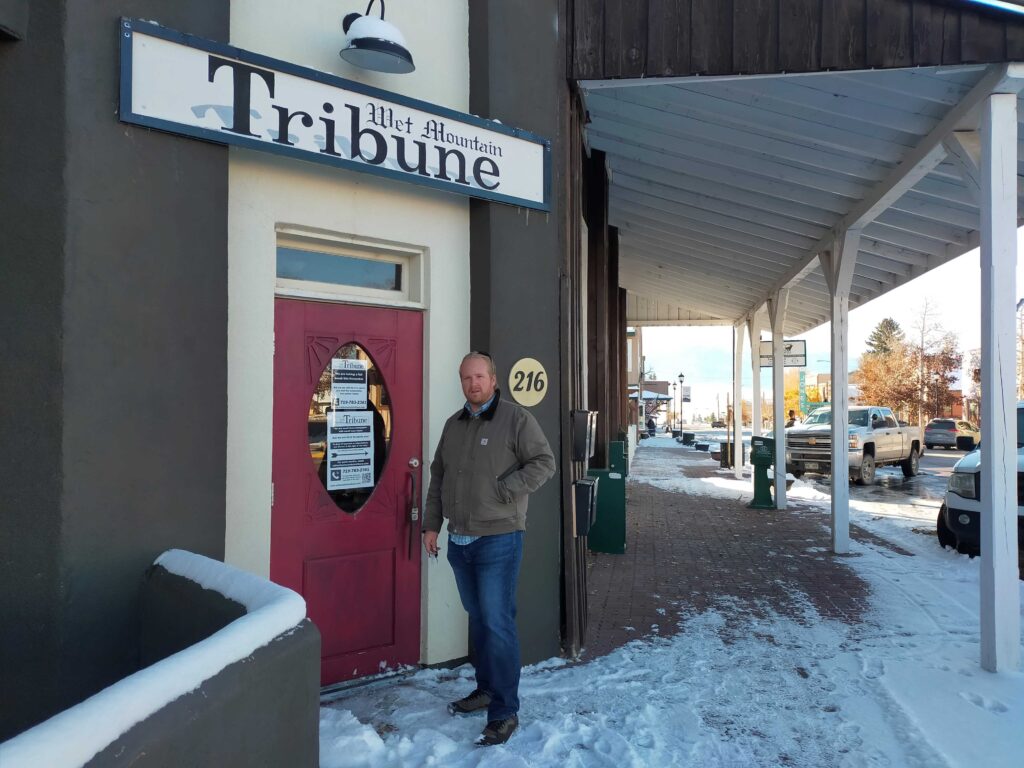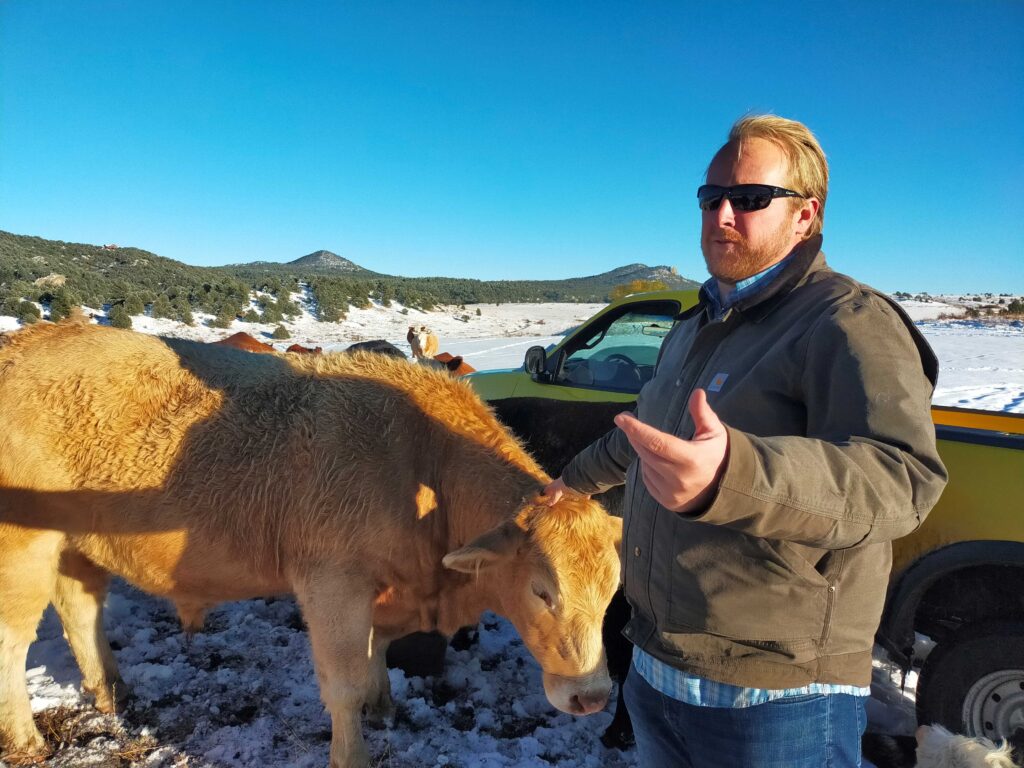
Photo by Konrad Flæte Gundersen
By: Konrad Flæte Gundersen
______________________________________________________________________________
WESTCLIFFE — Grappling with a changing climate – environmentally and politically – cattle rancher and newspaperman Jordan Hedberg has committed himself to leaving a positive impact on the place where he grew up.
But as Hedberg walked from his office at the Wet Mountain Tribune through the main street of Westcliffe on a recent afternoon, he confided that he fears a slide into anarchy. It’s gotten to the point where he keeps a gun in his office desk for protection, he said.
The sun was shining and the snow dusted Sangre de Cristo mountains loomed just west of the town. A 270-pound former football offensive lineman, Hedberg spoke candidly about problems he has seen intensifying since his return to Westcliffe eight years ago – primarily political turmoil and environmental degradation as mountain snowpack and water flows change.
‘’I was always convinced I’d stay here forever,” he said. “But now I’m not so sure.”
Hedberg is the publisher of the Wet Mountain Tribune, a local newspaper that’s been around since 1883. In addition, he runs cattle on pastures in the Wet Mountain Valley to produce grass-fed beef.
Hedberg, 36, grew up on a family-ranch in Westcliffe, before moving to Illinois to attend Monmouth College where he studied history, business and finance. He played on the college football team.
He returned to Westcliffe when his father was having health problems and got a job at the Wet Mountain Tribune newspaper as a reporter for $11 an hour. In 2018, Hedberg bought the paper and took over as publisher.
Westcliffe’s political climate has deteriorated since 2013. Hedberg blames a competing newspaper, the Sangre de Cristo Sentinel, which has established itself as a rival voice in town. The Sentinel and its editor George Gramlich have been ”attacking people,” he said. This has led to discord in town, creating a climate where sheriff deputies must be posted in some public meetings, Hedberg said.
‘’We’re moving towards anarchy,’’ he said.
Gramlich did not respond to queries for this report.
Hedberg walked by the Sentinel offices. Sentinel employees have posted a ‘’Trump won’’ lawn sign in front of their office. The mission of the Sangre de Cristo Sentinel, according to its website, is ‘’to be the sentry for our fellow citizens and patriots, providing truth, awareness and alerts to dangers while protecting our God-given freedoms and our constitutional rights and liberties.’’
Hedberg is unsettled by the injection of Sentinel views.
‘’Left versus right isn’t really the question here – it is what do we want our future to look like,’’ he said.
The town’s increasingly divisive politics amount to mostly ‘’Republican in-fighting,’’ Hedberg said.
As sheriff deputies often must be posted at town meetings and as Sentinel supporters criticize the news accounts presented in the Wet Mountain Tribune, Hedberg no longer feels safe, he said. He raised concerns that he may be assaulted.
That’s why, to be safe, he keeps a handgun at the ready in his office at the Wet Mountain Tribune, he said.
‘’If it wasn’t for my size, things probably would’ve gone differently,’’ Hedberg said, referring to a recent town meeting.
‘’It devolves into: ‘This is communism!’ and I’m like, we’re talking about sidewalks!’’
Westcliffe’s political turmoil reflects an increasingly polarized political scene nationwide.
‘’We have a lot of the same issues as the rest of the state, but worse,’’ Hedberg said.
Gramlich and his supporters are targeting him because they view him as ‘’too liberal,’’ Hedberg said.
As an example, he cited a commentary written by Gramlich in May 2023, which claimed that Hedberg was arrested for domestic violence for violently attacking his girlfriend two years ago while drinking.
‘’That never happened,’’ Hedberg said.
In the late afternoon as the sun sank lower, he headed to his ranch to check on his cows. This work, he said, provides a much-needed refuge from the newspaper strufe with the Sentinel and the increasingly vitriolic town meetings.

Photo by Konrad Flæte Gundersen
He drove his bright yellow truck up an icy road and stepped out in a pasture and called to his cows, who quickly approached. One particularly affectionate cow looking to be pet, Cold Cut Combo (named after a Subway sandwich), repeatedly tried to nudge him with his blunt horns.
‘’I don’t know if I should be raising animals at all out here,’’ Hedberg said, describing his concern that raising livestock in an already degraded valley might be exacerbating the worsening environmental issues that are creating challenged around the Southwest.
Hedberg said he tries to run his ranch sustainably by finding a balance between ‘’making money’’ and ‘’destroying the environment.’’
The land where he runs cattle is protected under a conservation easement designed to help restore healthy environmental conditions. He rotates his cattle weekly to prevent overgrazing and the cows are entirely grass-fed, besides some hay in the wintertime.
Hedberg said his rotational grazing mimics how cows would naturally feed in the presence of predators, preventing them from overgrazing which would cause invasive plant species to take over. He said this is beneficial to the ecosystem not only because it protects native flora, but also because it increases the soil’s water retention by causing the grass to grow deeper roots which allow the soil to hold more water.
The grass Hedberg’s cattle feed on is subsurface irrigated, meaning moisture naturally rises through the soil and supplies the grass with water, Hedberg said. Thus, he does not need to supply the grass with any extra water to feed his cows.
Many Colorado residents are concerned about water scarcity, as droughts become increasingly common and debilitating across the Southwest. Farmers are amongst those most affected, because agriculture uses 80% of the state’s water.
After generations of ranching, the increasingly variable and delicate conditions create uncertainty, Hedberg said.
‘’Newspaper, agriculture, it’s not that different,’’ he said. ‘’It’s about how you deal with uncertainty.’’


